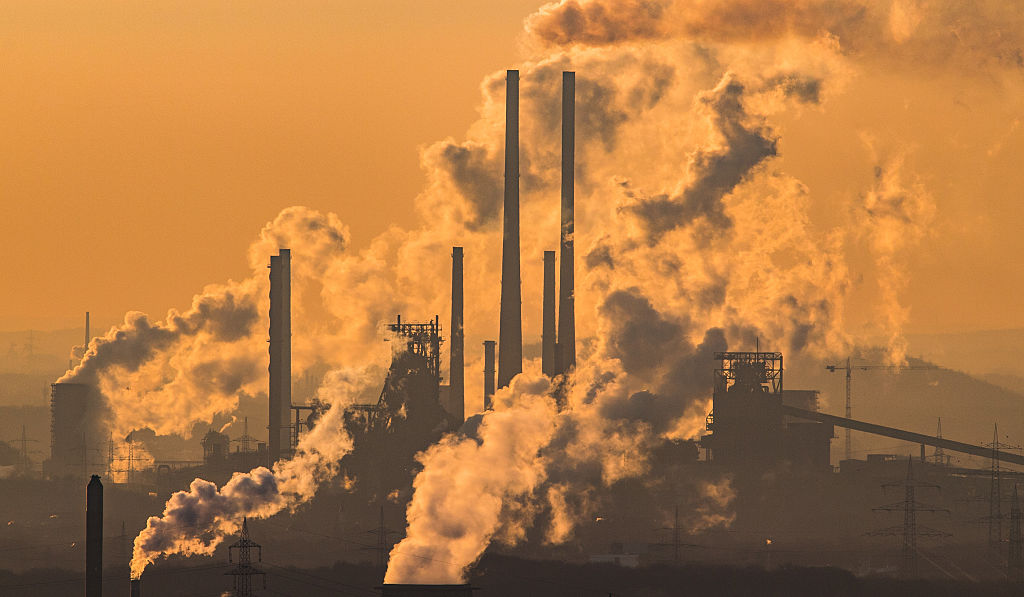U.S. greenhouse gas emissions fell 2.1 percent in 2019, report says


A free daily email with the biggest news stories of the day – and the best features from TheWeek.com
You are now subscribed
Your newsletter sign-up was successful
The United States saw a 2.1 percent decline in greenhouse gas emissions in 2019 — largely due to a decrease in coal consumption for power. But the U.S. has made little progress in limiting emissions elsewhere, according to a report by research company Rhodium Group.
Coal-fired power generation fell by 18 percent in 2019 — the largest year-on-year decline in U.S. history — reaching its lowest level since 1975. The majority of that decline is from the switch to natural gas and renewables, the report states.
Transportation emissions declined from last year by 0.3 percent, industrial emissions rose by 0.6 percent, emissions from buildings increased by 2.2 percent, and other emissions from sectors including agriculture and waste rose by 4.4 percent.
The Week
Escape your echo chamber. Get the facts behind the news, plus analysis from multiple perspectives.

Sign up for The Week's Free Newsletters
From our morning news briefing to a weekly Good News Newsletter, get the best of The Week delivered directly to your inbox.
From our morning news briefing to a weekly Good News Newsletter, get the best of The Week delivered directly to your inbox.
"It's clear that U.S. decarbonization success is still largely limited to the 27 percent of net emissions that come from the power sector," the report states.
Emissions from 2019 fell 12 percent below that of 2005 — 5 percent shy of the goal set by the Copenhagen Accord for the end of 2020. The U.S. pledged a 26 to 28 percent reduction by 2025 in the Paris Agreement, which the Trump Administration is working to withdraw from. The U.S. accounts for 11 percent of global greenhouse gas emissions, said Trevor Houser, co-author of the report, per The Washington Post.
It will take "large-scale fuel substitution" to make meaningful declines in emissions, not just efficiency efforts, the report says. It's still possible for the U.S. to meet emissions targets, the report notes, "but will require a significant change in federal policy — and pretty soon."
A free daily email with the biggest news stories of the day – and the best features from TheWeek.com
Taylor Watson is audience engagement editor for TheWeek.com and a former editorial assistant. She graduated from Syracuse University, with a major in magazine journalism and minors in food studies and nutrition. Taylor has previously written for Runner's World, Vice, and more.
-
 ‘Restaurateurs have become millionaires’
‘Restaurateurs have become millionaires’Instant Opinion Opinion, comment and editorials of the day
-
 Earth is rapidly approaching a ‘hothouse’ trajectory of warming
Earth is rapidly approaching a ‘hothouse’ trajectory of warmingThe explainer It may become impossible to fix
-
 Health insurance: Premiums soar as ACA subsidies end
Health insurance: Premiums soar as ACA subsidies endFeature 1.4 million people have dropped coverage
-
 Nobody seems surprised Wagner's Prigozhin died under suspicious circumstances
Nobody seems surprised Wagner's Prigozhin died under suspicious circumstancesSpeed Read
-
 Western mountain climbers allegedly left Pakistani porter to die on K2
Western mountain climbers allegedly left Pakistani porter to die on K2Speed Read
-
 'Circular saw blades' divide controversial Rio Grande buoys installed by Texas governor
'Circular saw blades' divide controversial Rio Grande buoys installed by Texas governorSpeed Read
-
 Los Angeles city workers stage 1-day walkout over labor conditions
Los Angeles city workers stage 1-day walkout over labor conditionsSpeed Read
-
 Mega Millions jackpot climbs to an estimated $1.55 billion
Mega Millions jackpot climbs to an estimated $1.55 billionSpeed Read
-
 Bangladesh dealing with worst dengue fever outbreak on record
Bangladesh dealing with worst dengue fever outbreak on recordSpeed Read
-
 Glacial outburst flooding in Juneau destroys homes
Glacial outburst flooding in Juneau destroys homesSpeed Read
-
 Scotland seeking 'monster hunters' to search for fabled Loch Ness creature
Scotland seeking 'monster hunters' to search for fabled Loch Ness creatureSpeed Read
